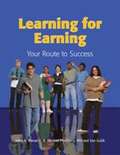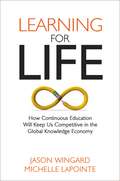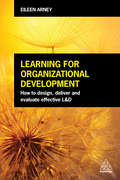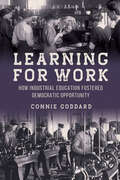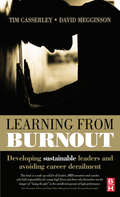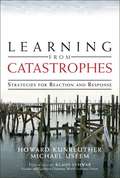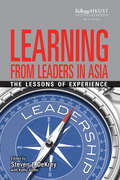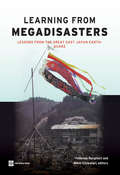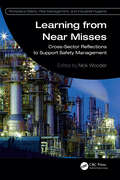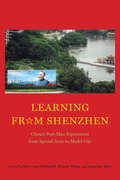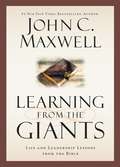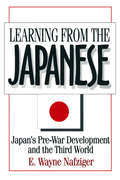- Table View
- List View
Learning by the Case Method in Marketing
by Thomas V. Bonoma Thomas J. KosnikIntroduces learning by the case method, with application to marketing learning. Places case learning in the stream of experiential learning and explains the advantages and disadvantages of experiential learning methods. Turning to case learning specifically, the note discusses the nature of cases, their construction using a physician-patient analogy, why companies cooperate with case writers, how cases are analyzed, the role of the case teacher, and the beneficial effects of successful case study. Concludes with some preparation guidelines for students and instructors and gives sources for further reading.
Learning for Careers: The Pathways to Prosperity Network (Work and Learning Series)
by Nancy Hoffman Robert B. SchwartzLearning for Careers provides a comprehensive account of the Pathways to Prosperity Network, a national initiative focused on helping more young people successfully complete high school, attain a first postsecondary credential with value in the labor market, and get started on a career without foreclosing the opportunity for further education. It takes as its starting point the influential 2011 Pathways to Prosperity report, which challenged the prevailing idea that the core mission of high schools was to prepare all students for college. In response, the Pathways Network was founded in 2012 to promote cooperative arrangements between educational and business institutions in order to fashion pathways for young people to acquire twenty-first-century skills and achieve professional success. This book traces the evolution of the Pathways Network over the past five years, focusing on the efforts of a diverse set of states and regions to build systems that span high school and the first two years of postsecondary education. States such as Delaware and Tennessee have been highly effective in establishing systems designed to equip students with credentials valued in the contemporary labor market. At the same time, the authors acknowledge the technical, political, and cultural challenges in redesigning career-focused education to produce satisfactory outcomes for young people throughout the country.Learning for Careers offers a way forward for the millions of young people and employers that face a rapidly evolving and ever more competitive globalized workplace. This book will be essential reading for all who have a stake in educational and economic opportunity in the United States.
Learning for Earning: Your Route to Success
by John A. Wanat E. Weston Pfeiffer Richard Van GulikFocuses on helping students understand self first, then making a career match. Identifies the workplace know-how needed for success on the job, as determined by the Secretary's Commission on Achieving Necessary Skills (SCANS).
Learning for Earning: Your Route to Success, 6th Edition
by John A. Wanat E. Weston Pfeiffer Richard Van GulikLearning for Earning presents the skills students need to succeed in school, on the job, and on their own. Teacher's Wraparound Edition provides teaching aids in the page margins for reviewing and reinforcing text content plus challenging activities that extend learning. The text includes a running glossary to highlight new terms presented in the chapters.
Learning for Life: How Continuous Education Will Keep Us Competitive in the Global Knowledge Economy
by Michelle Lapointe Jason WingardToday’s global knowledge economy requires individuals and companies alike to quickly adapt to new tools and strategies. To remain competitive, both must continually upgrade their skills. In the United States, however, support for ongoing education lags far behind other developed nations, creating a crippling skills gap.<P><P> How did we get to this point, and why are other countries faring markedly better? What keeps our nation’s vast network of corporate training, workforce development, and K-12 and college education so fragmented and inefficient? Gathering insights from key thought leaders and exemplary programs, Learning for Life examines: Why America’s existing educational models are failing employees and employers The shift from content knowledge toward new ways of thinking and working, grounded in creativity, critical thinking, communication, and collaboration Policies and programs that are working in the U.S. and abroad Recommendations for overhauling our education and training infrastructure and building partnerships between providers and employers In a constantly changing world, the stakes are high to ensure our workforce performs. Learning for Life points to the most promising pathways for getting there.
Learning for Organizational Development: How to Design, Deliver and Evaluate Effective L&D
by Eileen ArneyLearning for Organizational Development presents how to design, deliver and evaluate effective learning and development (L&D) programmes. This definitive guide to L&D's function in enhancing individual performance and organizational success is a core text for those studying for L&D qualifications such as the Chartered Institute of Personnel and Development (CIPD) Intermediate level as well as a useful handbook for L&D professionals looking to further their understanding of the latest developments.Complete with case studies and reflective questions to aid comprehension, Learning for Organizational Development considers the strategic business function of L&D for communicating the vital contribution that it makes to both individual performance and organizational success. It explores the role of L&D in talent development, showing how to support line managers in developing their people to drive retention and attraction. It also addresses the importance of developing the leadership capability within the organization, and provides practical guidance and examples of what works.
Learning for Work: How Industrial Education Fostered Democratic Opportunity
by Connie GoddardFounded in 1883, the Chicago Manual Training School (CMTS) was a short-lived but influential institution dedicated to teaching a balanced combination of practical and academic skills. Connie Goddard uses the CMTS as a door into America’s early era of industrial education and the transformative idea of “learning to do.” Rooting her account in John Dewey’s ideas, Goddard moves from early nineteenth century supporters of the union of learning and labor to the interconnected histories of CMTS, New Jersey’s Manual Training and Industrial School for Colored Youth, North Dakota’s Normal and Industrial School, and related programs elsewhere. Goddard analyzes the work of movement figures like abolitionist Theodore Weld, educators Calvin Woodward and Booker T. Washington, social critic W.E.B. Du Bois, Dewey himself, and his influential Chicago colleague Ella Flagg Young. The book contrasts ideas about manual training held by advocate Nicholas Murray Butler with those of opponent William Torrey Harris and considers overlooked connections between industrial education and the Arts and Crafts Movement. An absorbing merger of history and storytelling, Learning for Work looks at the people who shaped industrial education while offering a provocative vision of realizing its potential today.
Learning for a Lifetime: How New Managers Can Take Charge of Their Development and Build a Successful Career
by Linda A. HillYou've conquered your new role as manager--but now what? How do you establish a track record and credibility to build a career on? How do you choose the right positions to advance your career goals or create opportunities for your own growth and development? In this era of accelerating change and innovation, only those managers willing to become self-directed learners who continually strive to update their knowledge and skills will prosper throughout their careers. In this chapter, author Linda A. Hill shares the stories of some talented managers who have made a difference in their organizations, presenting a framework for lifelong learning and the development of a successful managerial career. This chapter was originally published as Chapter 12 of "Becoming a Manager: How New Managers Master the Challenges of Leadership."
Learning from Burnout
by David Megginson Tim CasserleyBurnout is a taboo subject. Admitting you are burning out in your job is tantamount to career suicide for some employees; for their organizations it is like raising a white flag in the war for talent. But suppose that preventing burnout is the worst thing you can do. Suppose for some people, particularly high fliers, it represents a call to deep and urgent learning about themselves and how they relate to the world. Suppose that we need instead to learn to manage burnout and harness the powerful learning potential of the experience, and in so doing build careers aligned with individual meaning and purpose, sustainable in the long term. What would organizations and their people need to do to achieve this?This book:* Explains what burnout is, how it is becoming the 21st-century business equivalent of the 'black death', and how it can derail your career* Highlights the financial, reputational and personal costs to organizations and people* Details how burnout can deliver a killer punch to talent management and the development of the leaders of tomorrow, and risk the retention, growth and productivity of high fliers* Explores why some of us develop a strong sense of our own, personal identity at work, while others find it more difficult* Presents a coaching process to manage burnout and harness its learning potential* Provides a framework for individuals to build careers aligned with individual meaning and purpose.
Learning from Catastrophes: Strategies for Reaction and Response
by Michael Useem Howard KunreutherBreakthrough, business-focused techniques for managing the growing risks of catastrophe, from world's leading experts--Indispensable 'extreme risks' guidance for decision-makers in a world that is becoming increasingly unstable. -Powerful assessment models, decision-making techniques, and best practices for building resilience into any organization, public or private. -Edited by the leading experts who recently introduced influential new techniques for managing extreme risks at the World Economic Forum. Events ranging from Hurricane Katrina to the global economic crisis have taught businesspeople an unforgettable lesson: if you don't plan for 'extreme risk,' you endanger your organization's very survival. But how can you plan for events that go far beyond anything that occurs in normal day-to-day business? In Learning from Catastrophes, two renowned experts present the first comprehensive strategic framework for assessing, responding to, and managing extreme risk. Howard Kunreuther and Michael Useem build on their own breakthrough work on mitigating natural disasters, extending it to the challenges faced by real-world enterprises. Along with the contributions of leading experts in risk management, heuristics, and disaster recovery, they identify the behavioral biases and faulty heuristics that mislead decision makers about the likelihood of catastrophe. They go on to identify the hidden links associated with extreme risks, and present techniques for systematically building greater resilience into the organization. The global best-seller The Black Swan told executives that 'once in a lifetime' events are far more common and dangerous than they ever realized. Learning from Catastrophe shows them exactly what to do about it.
Learning from Customer Defections
by Frederick F. ReichheldU.S. corporations lose half their customers every five years. But most managers fail to address that fact head-on by striving to learn why those defectors left. They are making a mistake, because a climbing defection rate is a sign that a business is in trouble. By analyzing the causes of defection, managers can learn how to stem the decline and build a successful enterprise. The longer customers stay with a company, the more they are worth. The key to customer loyalty is value creation. The key to value creation is organizational learning. And the key to organizational learning, says the author, is grasping the value of failure.
Learning from Entrepreneurial Failure
by Dean A. Shepherd Holger Patzelt Shepherd, Dean A. and Williams, Trenton and Wolfe, Marcus and Patzelt, Holger Trenton Williams Marcus WolfeLearning from Entrepreneurial Failure provides an important counterweight to the multitude of books that focus on entrepreneurial success. Failure is by far the most common scenario for new ventures and a critical part of the entrepreneurial process is learning from failure and having the motivation to try again. This book examines the various obstacles to learning from failure and explores how they can be overcome. A range of topics are discussed that include why some people have a more negative emotional reaction to failure than others and how these negative emotions can be managed; why some people delay the decision to terminate a poorly performing entrepreneurial venture; anti-failure biases and stigmatism in organizations and society; and the role that the emotional content of narratives plays in the sense-making process. This thought-provoking book will appeal to academic researchers, graduate students and professionals in the fields of entrepreneurship and industrial psychology.
Learning from Extreme Consumers
by Jill Avery Michael I. NortonTraditional market research methods focus on understanding the average experiences of average consumers. This focus leads to gaps in our knowledge of consumer behavior and often fails to uncover insights that can drive revolutionary, rather than evolutionary innovation. This note outlines a process for studying extreme consumers-consumers who fall in both tails of a normal distribution of customers-with needs, behaviors, attitudes, and emotions atypical of the average customer. Different tactics for leveraging the power of the fringe, product category virgins, customers with constraints, and lovers, haters, and opt-outers are presented.
Learning from Failure in Public: Teaching Adaptive Leadership
by Sharon D. ParksThis chapter reveals how students' own leadership failures are brought into disciplined dialogue with the theory to generate insight into personal blind spots and open a broader repertoire of creative responses for future situations.
Learning from Leaders in Asia
by Kathy Griffin Steven J. DekreyMore than ever, the world needs strong, effective and ethical leadership. Asia is the world's fastest growing region. Its success in the 21st century will depend largely on the quality of its leaders. Learning from Leaders in Asia captures the rich experiences of leaders operating in the region, identifies the key elements of leadership and offers practical advice on how to make a lasting impact. An important and timely book for all who want to seize the moment. Anson Chan, Former Chief Secretary for Administration, Hong Kong Special Administrative Region Learning from Leaders in Asia provides a solid understanding of the challenges faced by leaders in Asia today and tomorrow. It provides real life insights by leaders across various disciplines in overcoming challenges such as talent acquisition and retention, China strategies and globalization to name but a few. An invaluable read. Chen Shaopeng, President, Lenovo Emerging Market Group, Senior Vice President, Lenovo Group Learning from Leaders in Asia is a must-read for any business person in the world who wants to gain perspectives from Asia-based multinationals. It offers valuable insights as Asia's importance rises. William Fung, Group Managing Director, Li & Fung Ltd. Learning from Leaders in Asia presents a unique opportunity for readers to learn from the insights of the business executives who are part of one of the leading EMBA programs in the world. Having interacted with these talented men and women I can say with full confi dence that they truly understand the issues of building and running a global business. That makes this book well worth reading and I highly recommend it. Jim Thompson, Chairman, Crown Worldwide Holdings Ltd. Learning from Leaders in Asia cuts through the data and popular opinions to offer an on-the-ground view of the region's latest developments. Combining the acute perceptions and broad sweep of Leadership Experiences in Asia, this book examines the complex issues and offers fundamental insights into the business cultures of a host of countries. In lucid terms, it spells out the unprecedented opportunities and challenges facing companies wanting to devise a strategy that effectively adapts to the Asian reality. Marjorie Yang, Chair, Esquel Group This extraordinary book is the sequel to Leadership Experiences in Asia, Dr. DeKrey's first effort to describe the functioning of leadership in the Asian contexts. There is no-one with better credentials for doing this than DeKrey, an American who has lived and worked in Hong Kong for more than two decades and who has experienced the very best examples of leadership both in the West as well as in Asia. There is no one whose leadership skills cannot be enhanced by the principles and illustrations laid out in this book. David M. Messick, Morris and Alice Kaplan Professor Emeritus of Ethics and Decision in Management, Kellogg School of Management, Northwestern University This timely and highly relevant book tackles the critical issues that keep general managers awake at night as they strive to build a sustainable and profitable business in Asia and, in particular, China. The triple challenges of building talent, encouraging breakthrough innovation and ensuring strong governance may be global, but they face added urgency and complexity in Asia given the very high expectations for growth and unique cultural challenges. The blend of theory, strategy and highly practical experience in this book provides invaluable advice for leaders who are determined to build a legacy in Asia. Ron McEachern, President, PepsiCo Asia
Learning from LeapFrog: Creating Educational and Business Value
by Lynda M. Applegate Susan Saltrick Christopher DedeExplores the success factors leading to one's company's rise to the number three ranking in the aggressively competitive toy industry. LeapFrog has made the strategic decision to exploit its educational model in two industry sectors: consumer toys and educational supplemental materials. Senior executives face a number of challenges in sustaining the company's growth. Critical to its success is LeapFrog's ability to leverage its core assets, while simultaneously closely managing its relationships with customers, distributors, suppliers, and partners across these two very different industry sectors.
Learning from Megadisasters
by Federica Ranghieri Mikio IshiwatariWhile not all natural disasters can be avoided, their impact on a population can be mitigated through effective planning and preparedness. These are the lessons to be learned from Japan's own megadisaster: the Great East Japan Earthquake of 2011, the fi rst disaster ever recorded that included an earthquake, a tsunami, a nuclear power plant accident, a power supply failure, and a large-scale disruption of supply chains. It is a sad fact that poor communities are often hardest hit and take the longest to recover from disaster. Disaster risk management (DRM) should therefore be taken into account as a major development challenge, and countries must shift from a tradition of response to a culture of prevention and resilience. Learning from Megadisasters: Lessons from the Great East Japan Earthquake consolidates a set of 36 Knowledge Notes, research results of a joint study undertaken by the Government of Japan and the World Bank. These notes highlight key lessons learned in seven DRM thematic clusters--structural measures; nonstructural measures; emergency response; reconstruction planning; hazard and risk information and decision making; the economics of disaster risk, risk management, and risk fi nancing; and recovery and relocation. Aimed at sharing Japanese cutting-edge knowledge with practitioners and decision makers, this book provides valuable guidance to other disaster-prone countries for mainstreaming DRM in their development policies and weathering their own natural disasters.
Learning from Near Misses: Cross-Sector Reflections to Support Safety Management (Workplace Safety, Risk Management, and Industrial Hygiene)
by Nick WoodierLearning from Near Misses can provide opportunities to improve safety without the need for harm to have first occurred. Near misses are ‘free lessons’ which are high volume and rich in value. However, some sectors are yet to embrace learning from near misses to improve the effectiveness and safety of their operations. This book explores how near misses contribute to safety management across a range of high-risk sectors and shares lessons to help organisations, industries and sectors utilise learning from near misses in line with contemporary safety theory.This title discusses how the management of near misses has developed in the past 30 years since early clarification of the concept. It defines the ‘near miss’ and describes its unique features in relation to controls while debating relevant safety science and how different perspectives (e.g., Safety I and Safety II) can help extract valuable learning from near misses to improve safety. Case studies reveal how near misses are managed and learnt from across a range of sectors. The reader will learn to acknowledge and appreciate the complexities of near misses in modern systems and recognise the considerations that are required to extract learning from them.An ideal and essential read for safety practitioners, consultants and academics, this book is also suitable for those working in safety management in high-risk and highly regulated sectors.
Learning from Projects: Note on Conducting a Postmortem Analysis
by Stefan Thomke Steven Jay SinofskyDescribes how firms can learn from projects through postmortem analysis. Focuses on the step-by-step process of preparing and running a postmortem meeting as it is done at Microsoft and other software developers.
Learning from Shenzhen: China’s Post-Mao Experiment from Special Zone to Model City
by Jonathan Bach Mary Ann O'Donnell Winnie WongThis multidisciplinary volume, the first of its kind, presents an account of China’s contemporary transformation via one of its most important yet overlooked cities: Shenzhen, located just north of Hong Kong. In recent decades, Shenzhen has transformed from an experimental site for economic reform into a dominant city at the crossroads of the global economy. The first of China’s special economic zones, Shenzhen is today a UNESCO City of Design and the hub of China’s emerging technology industries. Bringing China studies into dialogue with urban studies, the contributors explore how the post-Mao Chinese appropriation of capitalist logic led to a dramatic remodeling of the Chinese city and collective life in China today. These essays show how urban villages and informal institutions enabled social transformation through cases of public health, labor, architecture, gender, politics, education, and more. Offering scholars and general readers alike an unprecedented look at one of the world’s most dynamic metropolises, this collective history uses the urban case study to explore critical problems and possibilities relevant for modern-day China and beyond.
Learning from Your Experience: Gather Lessons Where You Find Them
by Richard LueckeExperience through trial and error is a valuable lesson that can be applied to all future crises. Having a plan for capturing the lessons learned and synthesizing that information is an important part of crisis management. This chapter explains how you can integrate the lessons learned into current crisis planning to handle future crises more effectively.
Learning from the Fringe: Imagining the Future of Management
by Gary Hamel Bill BreenAccording to the author, uncommon insights often come from uncommon places. This chapter suggests that in order to glimpse the future of management, you must search for "positive deviants"--organizations and social systems that defy the norms of conventional practice. This chapter was originally published as chapter 9 of "The Future of Management."
Learning from the Giants: Life and Leadership Lessons from the Bible (Giants of the Bible)
by John C. MaxwellIf you could spend a few minutes with the giants of faith in the Old Testament in person, what lessons would they share with you? In LEARNING FROM THE GIANTS John C. Maxwell draws on fifty years of studying the Bible to share the stories of Elijah, Elisha, Job, Jacob, Deborah, Isaiah, Jonah, Joshua and Daniel. These people fought and won epic battles, served kings, and endured great hardships for God to come out on the other side transformed through His grace. Through them Maxwell explores timeless lessons we can learn about leadership, ourselves, and our relationship with God.
Learning from the India Way: Redefining Business Leadership
by Michael Useem Peter Cappelli Harbir Singh Jitendra V. SinghThe roaring success of Indian business in the last two decades points the world toward a different enterprise model than the one widely practiced in the U.S., with its emphasis on financial goals and shareholder value. Indeed, the global economic crisis of 2008-2009-widely viewed as being triggered by American excesses-has rekindled the debate about the proper role of personal gain and shareholder value in business affairs. In this chapter, authors Peter Cappelli, Harbir Singh, Jitendra Singh, and Michael Useem show how the India Way of conducting business presents a compelling alternative to the U.S. model. But is the India Way adaptable to other cultures and economies, or is it simply the product of India's unique economic and cultural landscape? In a refreshingly candid style, the authors explore both sides of this question. Ultimately, though, readers must decide for themselves which aspects of the India Way will prove most beneficial to their own operations. This chapter was originally published as Chapter 7 of The India Way: How India's Top Business Leaders Are Revolutionizing Management.
Learning from the Japanese: Japan's Pre-war Development and the Third World (Japan In The Modern World Ser.)
by E. Wayne NafzigerWith the collapse of the Soviet economy in the early 1990s, Japan has become the major non-Western model for late developing countries. This book looks at Japan's early economic modernisation to see if today's low-income countries can learn any lessons.


